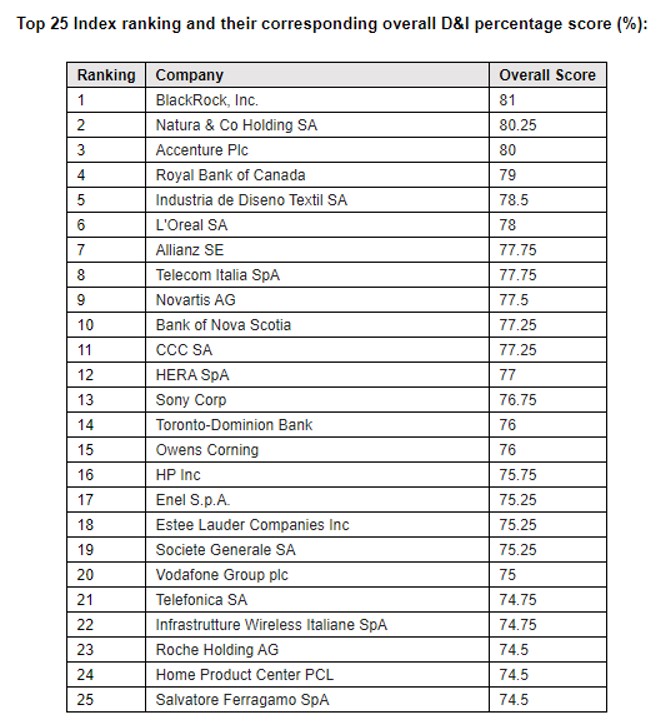Statistics
BlackRock Tops Refinitiv Diversity, Inclusion Index

The fact that such an index exists testifies to how these qualities are being tracked by investors fired up by ideas about sustainability, social practices and transparency.
The world’s largest asset manager, BlackRock, Brazilian personal
care products firm Natura & Co, and accountancy and consultancy
firm Accenture score first, second and third for being the most
diverse and inclusive in the world, according to a ranking by
data and information services firm Refinitiv.
Industries leading the firm’s Diversity and Inclusion Index Top
100 are banking, investment services and insurance firms with a
total of 18, followed by pharmaceuticals with nine and
telecommunications services, specialist retailers and personal
and household products and services with seven respectively. The
US leads the Top 100 list with 20 firms followed by the UK with
13, Australia with nine and Canada and France with
seven.
The index ratings, which are informed by Refinitiv’s
environmental, social, and governance data, are designed to
measure relative performance of close to 10,000 companies
representing 80 per cent and more of global market cap across
more than 450 ESG data points, to provide clients with a critical
and differentiated insight. The Index was launched in 2016.
The publication of these figures highlights how qualities such as
diversity and inclusion are increasingly important selection
points for investors motivated by non-financial as well as
monetary concerns.
Refinitiv said the D&I Index rates and scores companies
across four main points: Diversity, inclusion, people development
and controversies. Only companies with scores across all four
pillars are assigned an overall score (the average of the pillar
scores).
“Some of the largest asset managers in the world have this year
become much more active in engaging in shareholder voting on the
issue of improving diversity and even the world’s oldest private
banks have taken to the industry stage to discuss their
investment strategies around ESG,” Sang Lee, managing partner at
Aite Group, said.
William Trout, head of wealth management at Celent, said: “ESG
today has reached a tipping point, and issues related to employee
welfare, gender equality, supplier diversity and other social
concerns today vie with governance and environmental
considerations for attention. Firms must prioritise diversity and
inclusion or face tangible pressure from activists and consumers
as well as investors, particularly as stakeholder capitalism
challenges the primacy of the shareholder in corporate
decision-making.”
Findings
Globally the cultural diversity of board members has increased
from five years ago but has stalled at around 30 per cent.
Europe, the Middle East and Africa (EMEA) leads the way with the
most culturally and gender diverse boards, while at country
level, Germany is the only country that has maintained a positive
increase in the percentage of culturally diverse board
members.
Regionally, Africa is ahead of other regions with on average 34
per cent of female managers.
